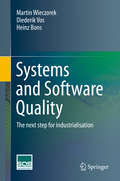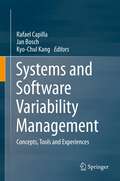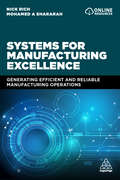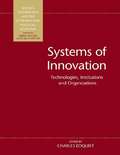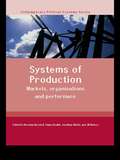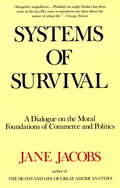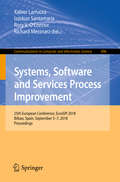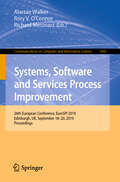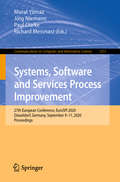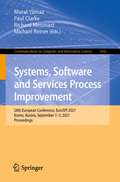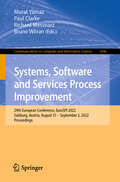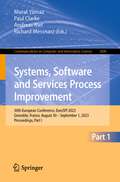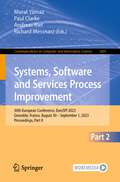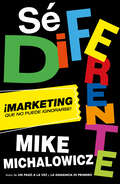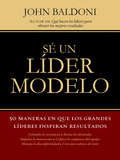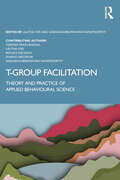- Table View
- List View
Systems and Software Quality
by Martin Wieczorek Diederik Vos Heinz BonsSoftware and systems quality is playing an increasingly important role in the growth of almost all ─ profit and non-profit ─ organisations. Quality is vital to the success of enterprises in their markets. Most small trade and repair businesses use software systems in their administration and marketing processes. Every doctor's surgery is managing its patients using software. Banking is no longer conceivable without software. Aircraft, trucks and cars use more and more software to handle their increasingly complex technical systems. Innovation, competition and cost pressure are always present in on-going business decisions. The question facing all these organisations is how to achieve the right quality of their software-based systems and products; how to get the required level of quality, a level that the market will reward, a level that mitigates the organisation's risks and a level that the organisation is willing to pay for. Although a number of good practices are in place, there is still room for huge improvements. Thus, let us take a look into the two worlds of "Embedded systems" and "ICT systems" and let us learn from both worlds, from overlaps and individual solutions. The next step for industrialisation in the software industry is required now. Hence, three pillars will be focused in this book: (1) a fundamental notion of right software and systems quality (RiSSQ); (2) portfolio management, quality governance, quality management, and quality engineering as holistic approach over the three layers of an enterprise, i. e. strategic, tactical, and operational layer; and (3) an industrialisation framework for implementing our approach.
Systems and Software Variability Management
by Jan Bosch Rafael Capilla Kyo-Chul KangThe success of product line engineering techniques in the last 15 years has popularized the use of software variability as a key modeling approach for describing the commonality and variability of systems at all stages of the software lifecycle. Software product lines enable a family of products to share a common core platform, while allowing for product specific functionality being built on top of the platform. Many companies have exploited the concept of software product lines to increase the resources that focus on highly differentiating functionality and thus improve their competitiveness with higher quality and reusable products and decreasing the time-to-market condition. Many books on product line engineering either introduce specific product line techniques or include brief summaries of industrial cases. From these sources, it is difficult to gain a comprehensive understanding of the various dimensions and aspects of software variability. Here the editors address this gap by providing a comprehensive reference on the notion of variability modeling in the context of software product line engineering, presenting an overview of the techniques proposed for variability modeling and giving a detailed perspective on software variability management. Their book is organized in four main parts, which guide the reader through the various aspects and dimensions of software variability. Part 1 which is mostly written by the editors themselves introduces the major topics related to software variability modeling, thus providing a multi-faceted view of both technological and management issues. Next, part 2 of the book comprises four separate chapters dedicated to research and commercial tools. Part 3 then continues with the most practical viewpoint of the book presenting three different industry cases on how variability is managed in real industry projects. Finally, part 4 concludes the book and encompasses six different chapters on emerging research topics in software variability like e.g. service-oriented or dynamic software product lines, or variability and aspect orientation. Each chapter briefly summarizes "What you will learn in this chapter", so both expert and novice readers can easily locate the topics dealt with. Overall, the book captures the current state of the art and best practices, and indicates important open research challenges as well as possible pitfalls. Thus it serves as a reference for researchers and practitioners in software variability management, allowing them to develop the next set of solutions, techniques and methods in this complicated and yet fascinating field of software engineering.
Systems for Manufacturing Excellence: Generating efficient and reliable manufacturing operations
by Professor Nick Rich Mohamed Afy ShararahMany production managers have de-stocked excessively large inventories, gone lean, experimented with continuous improvement processes and introduced new working practices. These interventions have largely failed. Businesses have also failed to invest in the workforce that undertakes improvements. This means that cash flow stops quickly, stocks are depleted to zero and customers lose confidence.Systems for Manufacturing Excellence looks at how people and technology work effectively together to generate high performance manufacturing and service operations. Not everyone is a Toyota but that does not mean we cannot learn from such businesses. The book will present a logic, variety of approaches and methods that underpin the different models of high performance used by 'world class' businesses. The authors use examples from their training with Toyota, work with Tesco, and many world class manufacturing businesses that form their research agenda. The book will help teams run each part of their production process for effectiveness and efficiency, with a high level of discipline that supports excellence in performance.
Systems of Cities and Facility Location (Fundamentals Of Pure And Applied Economics Ser. #Vol. 2)
by P. Hansen J. Henderson M. Labbe J. Peeters J. ThisseFirst Published in 2001. Routledge is an imprint of Taylor & Francis, an informa company.
Systems of Innovation: Technologies, Institutions and Organizations (Elgar Mini Ser.)
by Charles EdquistThe systems of innovation approach is considered by many to be a useful analytical approach for better understanding innovation processes as well as the production and distribution of knowledge in the economy. It is an appropriate framework for the empirical study of innovations in their contexts and is relevant for policy makers. This text is the result of the work within an international inter-disciplinary network or "working seminar" with the task of building a more solid and sophisticated conceptual and theoretical foundation for the continued study of innovations in a systemic context. The book has three parts. The first presents an overview and tries to work out some conceptual problems. In the second, the systems of innovation approach is related to innovation theory. Part three is devoted to increasing understanding of the functioning and dynamics of systems of innovation. There is also an introduction where the genesis and anatomy of different systems of innovation approaches are discussed and where the systems of innovation approach is characterized in nine dimensions.
Systems of Production: Markets, Organisations and Performance (Routledge Studies in Contemporary Political Economy)
by Simon Deakin Jonathan Michie Jill Rubery Brendan BurchellIn recent years we have seen the predictions of our forebears that leisure time would increase as the years pass utterly confounded. It is a fact of life that in major cities across the world, transport systems are full to bursting with people on their way to and from work. As people have come to accept longer working hours as a way of life, a number of new issues have come into play.These include labour market regulation, contract work and outsourcing, wages and increased attempts at better organisation. The impressive array of expert contributors, including Mark Harvey, Jane Humphries and Frank Wilkinson, have compiled a comprehensive and interesting book.
Systems of Survival: A Dialogue on the Moral Foundations of Commerce and Politics
by Jane JacobsThe author of The Death and Life of Great American Cities looks at business fraud and criminal enterprise, overextended government farm subsidies and zealous transit police, to show what happens when the moral systems of commerce collide with those of politics.
Systems of Violence, Second Edition: The Political Economy of War and Peace in Colombia (SUNY series in Global Politics)
by Nazih F. RichaniThis book examines the political, economic, and military factors that have contributed to thirty-seven years of protracted violent conflict in Colombia. Using four years of field research, and more than two hundred interviews, Nazih Richani examines Colombia's "war system"—the systemic interlacing relationship among actors in conflict, their respective political economy, and also the overall political economy of the system they help in creating. Several key questions are raised, including when and why do some conflicts protract, and what types of socioeconomic and political configurations make peaceful resolutions difficult to obtain? Also addressed are the lessons of other protracted conflicts, such as those found in Lebanon, Angola, and Italy. In this expanded second edition Richani contributes new chapters looking at developments in Colombia since the book's initial publication a decade ago and a look at the challenges for peace that lie ahead.
Systems, Decision and Control in Energy III (Studies in Systems, Decision and Control #399)
by Artur ZaporozhetsThis book describes new energy saving methods and technologies for heat power engineering. The book is devoted to topical issues of energy and related industries. Leading Ukrainian scientists from both scientific institutes and educational universities took part in its creation. The research results are presented in 6 parts: electrical engineering, heat power engineering, nuclear power engineering, fossil fuels, cybersecurity and computer science, environmental safety. Results of regulating of operating modes and applicability of model checking technique in power systems are showed. Separate block of questions regarding the functioning of nuclear power plants, their waste and preventive measures of protection against negative effects on living organisms (including, for example, the Chernobyl nuclear power plant) is considered. The results of the peculiarities of the extraction, purification and use of fossil fuels are presented. In some chapters, presented the results on improving the cybersecurity of energy systems and its resilience to various threats, including the use of 5G technology. Traditionally for this series, issues of ecological safety, the impact of different energy systems on the environment and its protection are considered. A book is for researchers, engineers, as well as lecturers and postgraduates of higher education institutions dealing with energy sector, power systems, ecological safety, etc.
Systems, Experts and Computers: The Systems Approach in Management and Engineering, World War II and After
by Agatha C. Hughes Thomas P. HughesAfter World War II, a systems approach to solving complex problems and managing complex systems came into vogue among engineers, scientists, and managers, fostered in part by the diffusion of digital computing power.
Systems, Procedures and Voting Rules in Context: A Primer for Voting Rule Selection (Advances in Group Decision and Negotiation #9)
by Hannu Nurmi Danielle Costa Morais Adiel Teixeira de AlmeidaThis book deals with the choice of methods to be applied in the decision processes within organizations. It discusses the use of voting procedures for group decision in business organizations, focusing on decision-making contexts. Within this book the reader explores the relevant part of the decision-making process consisting of choosing the voting procedures and recognizing the drawbacks of that procedure. This book includes a unique feature of providing a framework for choosing the voting procedure that is the most appropriate for a particular business decision process. The book is useful for a broad researcher audience dealing with the group decision making processes within business organizations and for practitioners and students working in the group decision and negotiation field.
Systems, Software and Services Process Improvement: 25th European Conference, EuroSPI 2018, Bilbao, Spain, September 5-7, 2018, Proceedings (Communications in Computer and Information Science #896)
by Rory V. O'Connor Richard Messnarz Xabier Larrucea Izaskun SantamariaThis volume constitutes the refereed proceedings of the 25th European Conference on Systems, Software and Services Process Improvement, EuroSPI conference, held in Bilbao, Spain, in September 2018.The 56 revised full papers presented were carefully reviewed and selected from 95 submissions. They are organized in topical sections on SPI context and agility, SPI and safety testing, SPI and management issues, SPI and assessment, SPI and safety critical, gamifySPI, SPI in industry 4.0, best practices in implementing traceability, good and bad practices in improvement, safety and security, experiences with agile and lean, standards and assessment models,team skills and diversity strategies, SPI in medical device industry, empowering the future infrastructure.
Systems, Software and Services Process Improvement: 26th European Conference, EuroSPI 2019, Edinburgh, UK, September 18–20, 2019, Proceedings (Communications in Computer and Information Science #1060)
by Richard Messnarz Rory V. O’Connor Alastair WalkerThis volume constitutes the refereed proceedings of the 26th European Conference on Systems, Software and Services Process Improvement, EuroSPI conference, held in Edinburgh, Scotland, in September 2019. The 18 revised full papers presented were carefully reviewed and selected from 28 submissions. They are organized in topical sections: Visionary Papers, SPI and Safety and Security, SPI and Assessments, SPI and Future Qualification & Team Performance, and SPI Manifesto and Culture. The selected workshop papers are also presented and organized in following topical sections: GamifySPI, Digitalisation of Industry, Infrastructure and E-Mobility. -Best Practices in Implementing Traceability. -Good and Bad Practices in Improvement. -Functional Safety and Cybersecurity. -Experiences with Agile and Lean. -Standards and Assessment Models. -Team Skills and Diversity Strategies. -Recent Innovations.
Systems, Software and Services Process Improvement: 27th European Conference, EuroSPI 2020, Düsseldorf, Germany, September 9–11, 2020, Proceedings (Communications in Computer and Information Science #1251)
by Paul Clarke Murat Yilmaz Richard Messnarz Jörg NiemannThis volume constitutes the refereed proceedings of the 27th European Conference on Systems, Software and Services Process Improvement, EuroSPI conference, held in Düsseldorf, Germany, in September 2020*. The 50 full papers and 13 short papers presented were carefully reviewed and selected from 100 submissions. They are organized in topical sections on visionary papers, SPI manifesto and improvement strategies, SPI and emerging software and systems engineering paradigms, SPI and standards and safety and security norms, SPI and team performance & agile & innovation, SPI and agile, emerging software engineering paradigms, digitalisation of industry, infrastructure and e-mobility, good and bad practices in improvement, functional safety and cybersecurity, experiences with agile and lean, standards and assessment models, recent innovations, virtual reality. *The conference was partially held virtually due to the COVID-19 pandemic.
Systems, Software and Services Process Improvement: 28th European Conference, EuroSPI 2021, Krems, Austria, September 1–3, 2021, Proceedings (Communications in Computer and Information Science #1442)
by Paul Clarke Murat Yilmaz Richard Messnarz Michael ReinerThis volume constitutes the refereed proceedings of the 28th European Conference on Systems, Software and Services Process Improvement, EuroSPI 2021, held in Krems, Austria, in September 2021*.The 42 full papers and 9 short papers presented were carefully reviewed and selected from 100 submissions. The volume presents core research contributions and selected industrial contributions. Core research contributions: SPI and emerging software and systems engineering paradigms; SPI and team skills and diversity; SPI and recent innovations; SPI and agile; SPI and standards and safety and security norms; SPI and good/bad SPI practices in improvement; SPI and functional safety and cybersecurity; digitalisation of industry, infrastructure and e-mobility. Selected industrial contributions: SPI and emerging software and systems engineering paradigms; SPI and recent innovations; SPI and agile; SPI and standards and safety and security norms; SPI and good/bad SPI practices in improvement; SPI and functional safety and cybersecurity; digitalisation of industry, infrastructure and e-mobility; virtual reality.*The conference was partially held virtually due to the COVID-19 pandemic.
Systems, Software and Services Process Improvement: 29th European Conference, EuroSPI 2022, Salzburg, Austria, August 31 – September 2, 2022, Proceedings (Communications in Computer and Information Science #1646)
by Paul Clarke Murat Yilmaz Richard Messnarz Bruno WöranThis volume constitutes the refereed proceedings of the 29th European Conference on Systems, Software and Services Process Improvement, EuroSPI 2022, held in Salzburg, Austria, in August-September 2022.The 49 full papers and 8 short papers presented were carefully reviewed and selected from 110 submissions. The papers are organized according to the following topical sections: SPI and emerging and multidisciplinary approaches to software engineering; digitalisation of industry, infrastructure and e-mobility; SPI and good/bad SPI practices in improvement; SPI and functional safety and cybersecurity; SPI and agile; SPI and standards and safety and security norms; SPI and team skills and diversity; SPI and recent innovations; virtual reality and augmented reality.
Systems, Software and Services Process Improvement: 30th European Conference, EuroSPI 2023, Grenoble, France, August 30 – September 1, 2023, Proceedings, Part I (Communications in Computer and Information Science #1890)
by Paul Clarke Murat Yilmaz Richard Messnarz Andreas RielThis two-volume set constitutes the refereed proceedings of the 30th European Conference on Systems, Software and Services Process Improvement, EuroSPI 2023, held in Grenoble, France, in August-September 2023.The 47 full papers presented were carefully reviewed and selected from 100 submissions. The papers are organized according to the following topical sections: SPI and emerging and multidisciplinary approaches to software engineering; digitalisation of industry, infrastructure and e-mobility; SPI and good/bad SPI practices in improvement; SPI and functional safety and cybersecurity; SPI and agile; SPI and standards and safety and security norms; sustainability and life cycle challenges; SPI and recent innovations; virtual reality and augmented reality.
Systems, Software and Services Process Improvement: 30th European Conference, EuroSPI 2023, Grenoble, France, August 30 – September 1, 2023, Proceedings, Part II (Communications in Computer and Information Science #1891)
by Paul Clarke Murat Yilmaz Richard Messnarz Andreas RielThis two-volume set constitutes the refereed proceedings of the 30th European Conference on Systems, Software and Services Process Improvement, EuroSPI 2023, held in Grenoble, France, in August-September 2023.The 47 full papers presented were carefully reviewed and selected from 100 submissions. The papers are organized according to the following topical sections: SPI and emerging and multidisciplinary approaches to software engineering; digitalisation of industry, infrastructure and e-mobility; SPI and good/bad SPI practices in improvement; SPI and functional safety and cybersecurity; SPI and agile; SPI and standards and safety and security norms; sustainability and life cycle challenges; SPI and recent innovations; virtual reality and augmented reality.
Szycher’s Practical Handbook of Entrepreneurship and Innovation
by Michael SzycherThis practical and comprehensive handbook offers step-by-step instruction, guiding entrepreneurs of innovative technology startups all the way from idea to profitability. With its easy-to-follow format aimed at both experienced as well as novice entrepreneurs, this book covers all technical, financial, legal, and governmental hurdles facing startups. It discusses common causes of business failure and points out the pitfalls to avoid in getting innovative technology successfully to market.
Sèrum d'una nit d'estiu
by Enfermera SaturadaLa Satu, la Enfermera Saturada, la Florence Nightingale de les xarxes socials, torna a la càrrega amb un llibre més il·lustrat i acolorit que mai. Haurà aconseguit la plaça fixa? Haurà trobat l'amor? O, millor encara..., tindrà ja el seu propi armariet? Cansada dels torns de nit que no s'acaben mai? La teva supervisora no col·labora en el pot de cafè i, a sobre, esmorza dues vegades? No suportes aquella companya que s'amaga al lavabo quan sona el timbre del pacient aïllat? La teva tutora et demana que prenguis la pressió amb l'aparell de l'any de la picor? No pateixis més! La Florence Nightingale de les xarxes socials ha tornat a posar-se el pijama! Aquest llibre no farà que deixis de fer torns de nit, però si més no farà que els facis amb un gran somriure. Benvinguda al nou món de la infermeria amb humor!Benvinguda al món de la Enfermera Saturada! ------- Piràmide de Maslow dels pacients ingressatsTinc visió?Em molesta la via.Conec una infermera que treballa en aquest hospital (és baixeta, morena...).Em sembla que hi ha aire al sèrum.Fa quatres dies que no cago (i me'n recordo a les 4.00 de la matinada.). Piràmide de Maslow dels acompanyants/visitesLa meva mare fa quatre dies que no caga.Com funciona la tele?En aquesta planta, hi ha el Pep, de la Lucita? El van ingressar ahir.Es que no penseu portar-li res per menjar?A quina hora passa el metge? ------- Opinions:«Un llibre molt bo.»Paco. 74. S'arrenca la via i diu que se li ha caigut. «Jo vinc a l'hospital a veure si m'hi trobo la Enfermera Saturada.»Rosa. 37. Ve a Urgències perquè té vòmits i pregunta si pot menjar alguna cosa. «Aquesta infermera és una crac. Miri, miri quin sèrum m'ha posat, ni una bombolla d'aire!»María Luisa. 56. Viu amb la por que una bombolla li prengui la vida. «M'he rigut tant amb aquest llibre que se m'han escapat unes gotetes.»Carmen. 94. Més anys que saturació d'oxigen.
Sé diferente: ¡Marketing que no puede ignorarse!
by Mike MichalowiczUNA RUTA PARA DESCUBRIR LA ESENCIA DE TU NEGOCIO, DETONAR TU CREATIVIDAD, MULTIPLICAR TUS VENTAS, ALCANZAR EL ÉXITO Y COLOCARTE EN LA CIMA DE TU MERCADO. Todos los emprendedores y empresarios quieren ser los mejores del mercado, pero lo cierto es que para los consumidores conseguir el mejor producto no es suficiente. En cambio, quienes se distinguen de los demás competidores siempre ganan.Esta guía de marketing, como ya es costumbre en los libros de Mike Michalowicz, ofrece un método simple de tres pasos con los que podrás posicionar tu negocio, atraer prospectos y convertir las oportunidades en ventas:1. DIFERÉNCIATE2. ATRAE3. DIRIGETodo ello enriquecido con valiosos ejemplos de emprendedores que han puesto en práctica esta fórmula, y con el humor tan característico que distingue a Michalowicz.
Sé un líder modelo
by John BaldoniEncargarse del trabajo de mayor nivel, ya sea como director ejecutivo de una empresa o gerente de un departamento, nunca es fácil. Cuando se hace de la forma correcta, resulta en un liderazgo inspirador; pero si se hace del modo contrario, puede llevar al desastre. Para ser eficaces, las personas a cargo deben darle a su equipo una razón para creer en sus talentos y su capacidad de poner a las personas a trabajar juntas. Un alto grado de liderazgo requiere determinación, autoridad, convicción, compasión y, lo más importante, la capacidad de dar un buen ejemplo. Puede parecer fácil, pero ponerlo en práctica puede llevar toda la vida. En Sé un líder modelo, el reconocido gurú del liderazgo John Baldoni revela las características y capacidades que deben tener los líderes para inspirar a otros a seguirlos.
S’intégrer pour s’enrichir
by Elias T. Ayuk Samuel T. KaboréL'intégration régionale comme premier pas vers l'accès au marché mondial? Dans un contexte où la libéralisation du commerce n'a pas entraîné les gains escomptés par les pays sous-développés et où la croissance du commerce mondial ne s'est pas accompagnée d'une croissance économique équivalente, une solution alternative a émergée. Un nouveau paradigme a fait valoir que la libéralisation des échanges devait s'accompagner d'investissements publics. Cela dit, la nature même de la libéralisation du commerce entraîne une diminution des ressources nécessaires aux investissements publics. Sur la base d'arguments solides, les pays sous-développés sont donc actuellement encouragés à mettre d'abord l'accent sur l'intégration régionale avant de rechercher l'accès au marché mondial. Cet ouvrage, qui aborde les questions liées à l'intégration régionale en Afrique de l'ouest, présente des données empiriques sur les efforts entrepris par les pays de l'Union économique et monétaire ouest-africaine (UEMOA) pour la convergence de leurs économies. Il examine également comment ces efforts, qui représentent un élément important pour l'intégration régionale, influent sur la réduction de la pauvreté dans les pays de l'UEMOA. Il intéressera par conséquent tous les chercheurs qui travaillent sur ce thème.
T-Group Facilitation: Theory and Practice of Applied Behavioural Science
by Lalitha Iyer Sharad Sakorkar Sankarasubramanyan Ramamoorthy Tejinder Singh Bhogal Renuka Raj SinghThis book offers the core conceptual base for the practice of T-Group facilitation. Drawing from the fields of psychology, social psychology, sociology, diversity studies and Indian philosophical thoughts, this book is a great resource for enhancing the practice of T-Group facilitation, for both budding and established facilitators. It covers a wide range of theories on human development, self-awareness, interpersonal interactions, groups and change. Individual and group identities, diversity, inclusion and social hierarchies are explored in detail here. The authors offer a model of T-Group facilitation based on 50 years of experience within the Indian Society for Applied Behavioural Science (ISABS). This model is useful not only for fellow practitioners of T-Groups but also for anyone engaged in facilitating groups, organizations and communities globally. This book helps one to reflect, develop and sharpen one’s competencies, values and ethics in this field. The chapters are embedded with activities, quizzes, case studies and exercises to facilitate a deeper understanding of the various elements used in the book. This book will be of interest to students, teachers and practitioners of psychology, social psychology, management studies and organizational development. It will also be useful for T-Group facilitators, facilitators of experiential groups and related fields.
T-Mobile in 2013: The Un-Carrier
by Francesca Gino Jonathan Lee John Beshears Sean Yixiang WangBy 2013, the U.S. wireless industry was in the midst of a costly transition. As consumers began to embrace more sophisticated mobile devices, the industry's four main players spent heavily to improve their infrastructures for providing reliable high-speed data services. T-Mobile, the smallest of the four major carriers, lacked the scale of its competitors and risked falling further behind in the contest for market share. Faced with this daunting business environment, T-Mobile's new CEO declared war on the rest of the industry, decrying competitor pricing practices and upending the traditional contract-based business model. This case provides background information on the state of the wireless industry in 2013 and follows T-Mobile's early steps to transform its market position.
